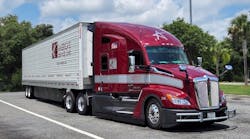A recent study strongly signals that cargo theft remains a major—and growing-- problem in the U.S., affecting a wide range of goods and in particular posing a major hazard for truckers.
In its first cargo theft study – which it hopes to conduct annually – Forney, TX-based LoJack Supply Chain Integrity (LoJack SCI) analyzed data compiled last year from its 1,500 members via its Supply Chain-Information Sharing and Analysis Center (SC-ISAC). Out of 353 security-related "incidents" reported in 2008, cargo theft was the most dominant activity with 299 cases.
"Cargo theft should be a major worry for truckers because it is most often perpetrated by organized crime, since it is low risk/high reward form of theft," Robert Furtado, LoJack SCI's CEO, told FleetOwner.
"We know that distribution over the Internet makes it possible to sell most any product virtually undetected – so,no one is safe from cargo theft, unless they take precautions," he warned. "Those measures include: keeping informed about theft trends, statistics, etc.; having plans in place in case theft does occur; and, most importantly, using the best technology solutions available to thwart thieves and recover stolen property."
Related Resources:
A recent study strongly signals that cargo theft remains a major—and growing-- problem in the U.S., affecting a wide range of goods and in particular posing a major hazard for truckers
In its first cargo theft study – which it hopes to conduct annually – Forney, TX-based LoJack Supply Chain Integrity (LoJack SCI) analyzed data compiled last year from its 1,500 members via its Supply Chain-Information Sharing and Analysis Center (SC-ISAC). Out of 353 security-related "incidents" reported in 2008, cargo theft was the most dominant activity with 299 cases.
"Cargo theft should be a major worry for truckers because it is most often perpetrated by organized crime, since it is low risk/high reward form of theft," Robert Furtado, LoJack SCI's CEO, told FleetOwner.
"We know that distribution over the Internet makes it possible to sell most any product virtually undetected – so,no one is safe from cargo theft, unless they take precautions," he warned. "Those measures include: keeping informed about theft trends, statistics, etc.; having plans in place in case theft does occur; and, most importantly, using the best technology solutions available to thwart thieves and recover stolen property."
Walt Fountain, director of enterprise security for Schneider National, confirmed that the risk of cargo theft has been increasing over the last two years across the supply chain as the value of individual loads continues to climb.
"One of the reasons cargo theft is 'low risk/high reward' is that more product value than ever before can go into the box," Fountain told FleetOwner. "It's relatively easy now for individual loads to contain $1 million worth of cargo. And if the thieves get caught, we'd be lucky if they'd get six months of jail time."
According to LoJack SCI's study, Texas and Georgia are the two states with the highest incidents of cargo theft, with truckstops and parking lots the most frequent locations where such thefts occur. Saturdays and Sundays are by far the most popular days for cargo theft, with Monday a distant third.
"This study shows that trucks are most vulnerable to theft when truckers are not present," LoJack SCI's pointed out. "When trucks are parked in yards, trucking companies should develop physical barriers including fenced, gated, guarded yards, wheel and trailer locks and seals. On the road, truckers should utilize process barriers, which include engaging immobilization procedures and check-in procedures while stationary."
The types of cargoes most frequently stolen is rather surprising, with food at the top of the list (13%), closely followed by pharmaceutical/medical and building supplies (both 12%). The unusually high percentage of building supplies thefts may be due in part to the rise in copper prices and the lack of oversight on the origins of scrap materials, noted Furtado. But recently enacted laws addressing ownership of materials for recyclers may help reduce this current theft trend.
"According to our analysis of the data, food and drugs are essentials andtare always a target of thieves, but especially so in a depressed economy," he added. "That may explain why those items topped the list, while 'nice-to-have' items like music, movies and software came in at only one percent."
Furtado reasons food has become more vulnerable to theft for a few key reasons."One is that since food is broadly distributed, available everywhere and not traceable, it doesn't draw the attention from law enforcement that a load of cigarettes or electronic components might receive," he explained. "Additionally, food may very well be a top target now because of our down economy, which makes 'essentials' such as food more in demand."
He also noted that initial efforts to reduce cargo theft focused on high value cargo such as computers, electronics, pharmaceuticals and tobacco. But as trucking and law enforcement focused on protecting those goods, it increased the challenge and risk involved to steal them, compelling thieves to go after other "less protected" shipments, such as food.
"However, while food represents a 'theft of opportunity,' it's important to note that thieves will continue go after the higher risk items as well," Furtado stressed.
Furtado also pointed out that the study shows cargo theft remains an ongoing problem that is very profitable for professional thieves and very costly for organizations throughout the supply chain.
"Especially in today's economic climate, companies cannot afford to pay the exorbitant price tag involved with having their cargoes stolen, which range from the actual value of the goods, to business downtime, to the loss of opportunities to market and sell seasonal goods, to the total loss of product sales," he noted. "This report clearly highlights the need for solutions that protect and preserve our global supply chain."
Related Resources:
Rates in 2008




